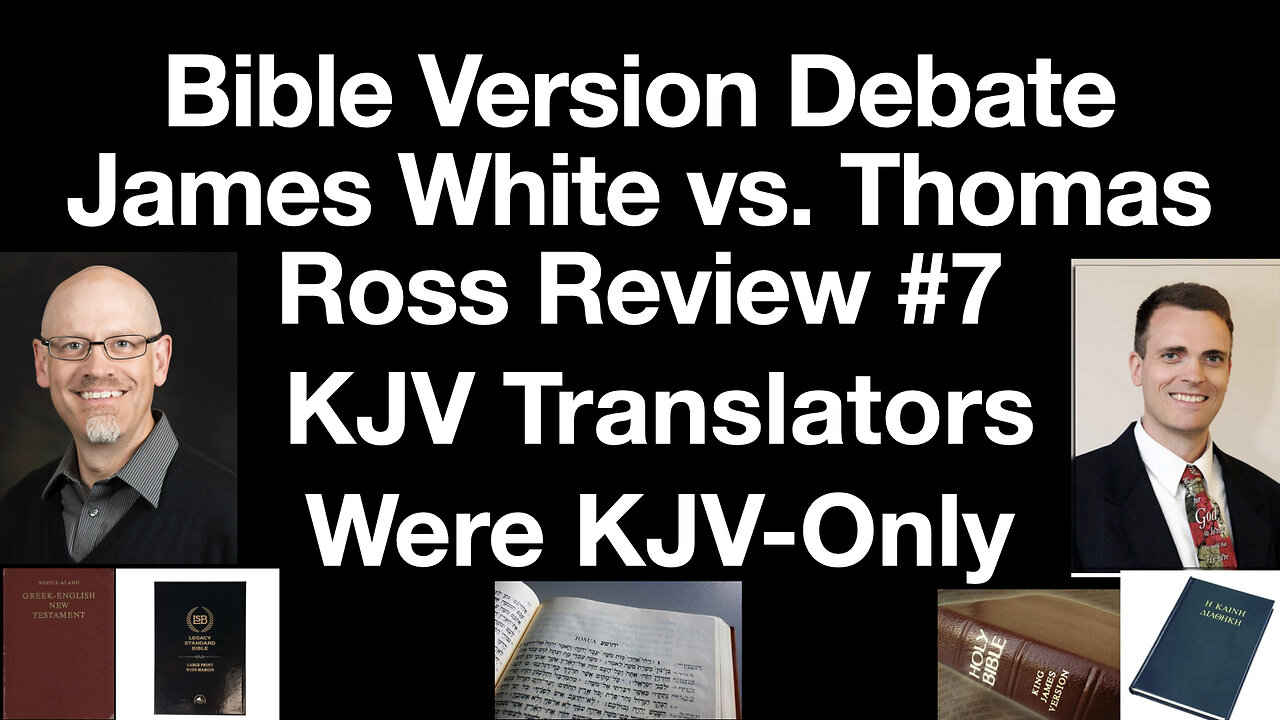Premium Only Content

James White & Thomas Ross Debate Review #7: KJV Translators, Other Versions & King James Bible Only
Earlier debate review videos have examined what the Dedicatory Epistle said about the KJV in relation to earlier English Bibles. What does the “Translators to the Reader” says about the Authorized Version in comparison to earlier English Bibles? Were the King James Version translators King James Only? Find out in this debate review, part 7, of the debate between Dr. White and Dr. Ross on: “The Legacy Standard Bible, as a representative of modern English translations based upon the UBS/NA text, is superior to the KJV, as a representative of TR-based Bible translations"!
It is important to keep in mind the historical context here. At this point in the preface the translators are disagreeing with Roman Catholics who thought it was better to not translate the Bible at all, but leave it only in Latin. The KJV translators were thankful for the earlier Textus Receptus-based English Bibles, such as the Tyndale, the Geneva, the Bishops’ Bible, and so forth. There are very few advocates of KJV-Onlyism or Confessional Bibliology who would not agree completely with these sentiments. They then stated:
Yet for all that, as nothing is begun and perfected at the same time, and the latter thoughts are thought to be the wiser: so, if we building upon their foundation that went before us, and being holpen by their labours, do ENDEAVOUR TO MAKE THAT BETTER WHICH THEY LEFT SO GOOD; no man, we are sure, hath cause to mislike us; they, we persuade ourselves, if they were alive, would thank us.
Note that the KJV translators say that they are very thankful for earlier English versions, but that, building upon their foundation, the KJV is “better.” Saying that the KJV is “better” than the other English versions, even other Textus-Receptus based Bibles, is very, very different from James White’s argument that the KJV preface shows that the KJV translators would have been fine with Textus Rejectus-based English versions that change many crucial doctrinal passages and are based on a very different, unbelieving textual philosophy. What the KJV translators say about earlier English Bibles does not at all lead to James White’s conclusion.
Discussing the Latin Vulgate, they go on to say that the Vulgate is decidedly inferior to any of the English Textus Receptus based versions. So the Latin-although they were thankful the Bible was translated into that language in Jerome’s day when Latin actually was a vulgar or common tongue spoken by people in general-was “far” worse than any of the Protestant, Textus Receptus based versions. Thus, the KJV preface was very far from placing all translations on the same level, or from having a careless attitude about the purity and preservation of the underlying language text. If they viewed the KJV as the best and most accurate of all the English versions, while the worst of the purely Textus Receptus based English versions was “far” better than the Latin Vulgate, although the Vulgate was quite a literal translation of a mainly Byzantine text (with some exceptions, such as in 1 Timothy 3:16), the KJV translators would have viewed modern English version that deviate from the Textus Receptus as FAR, FAR WORSE than their own translation, FAR, FAR WORSE than the earlier English Bibles, and far worse than the Latin Vulgate. The KJV preface provides no support at all for Brother White’s contention that the KJV translators would have preferred Textus Rejectus based English versions. On the contrary, they clearly would have viewed them as indubitably and strongly inferior!
When they speak positively about other translations, they are speaking about the currently extant English Bibles, every single one of which was based on the Textus Receptus, was made by people who believed in verbal inspiration, in justification by faith alone, and other crucial doctrines of Christianity, and based on a Greek text also edited by those who did the same—Stephanus and Beza. The KJV translators specifically speak of translations made by “men of our profession.” What profession was that? Verbal inspiration and preservation, as seen earlier in the KJV preface. Strong anti-Catholicism that would be indignant at someone like the Nestle-Aland editor Carlo Martini, a Roman Catholic cardinal committed to the Council of Trent, a right hand man of the Man of Sin, being on the Greek Testament editorial committee. Justification by grace alone through faith alone based on the imputed righteousness of Christ alone. “Men of our profession” would not support a Socinian or an Arian Bible, and so would rule out the Unitarian influence upon the Westcott-Hort Greek New Testament of 1881.
-
 3:59:36
3:59:36
StevieTLIVE
6 hours agoFriday Night Warzone HYPE
33.9K1 -
 3:47:10
3:47:10
SynthTrax & DJ Cheezus Livestreams
1 day agoFriday Night Synthwave 80s 90s Electronica and more DJ MIX Livestream Michael Jackson / AI Art Compilation Edition
39.9K -
 1:03:57
1:03:57
Sarah Westall
6 hours agoMara Lago Accord Joins the Fed, Fed Waves the White Flag & more w/ Andy Schectman
22K -
 2:44:12
2:44:12
I_Came_With_Fire_Podcast
1 day ago*BREAKING* Special Guest Katarina Szulc
32K5 -
 3:22:20
3:22:20
megimu32
6 hours agoOFF THE SUBJECT: FAFO Friday! Bodycams & Mario Kart Mayhem!
21.6K4 -
 55:36
55:36
Flyover Conservatives
1 day ago4 Strategies to Create Opportunity from Nothing - Clay Clark | FOC Show
27.3K -
 1:49
1:49
Gaming on Rumble
11 hours agoWhat is the Rumble Creator Program!?!? (Active Premium Creators) | Lvl UP
27.3K2 -
 5:56:26
5:56:26
Midnight In The Mountains
8 hours agoGaming w/ PER·SE·VER·ANCE | Midnights Play Fortnite | Split Screen Action!
18.2K2 -
 3:56:17
3:56:17
Nerdrotic
10 hours ago $13.80 earnedLet's TACO-bout Take Us North, Hollywood COPE! Cracker Barrel CRACKED! | Friday Night Tights 369
95.2K6 -
 1:16:30
1:16:30
RiftTV
8 hours agoHow Blue Light is Turning You Gay | The Rift | Guest: Jack Kruse
32.9K10